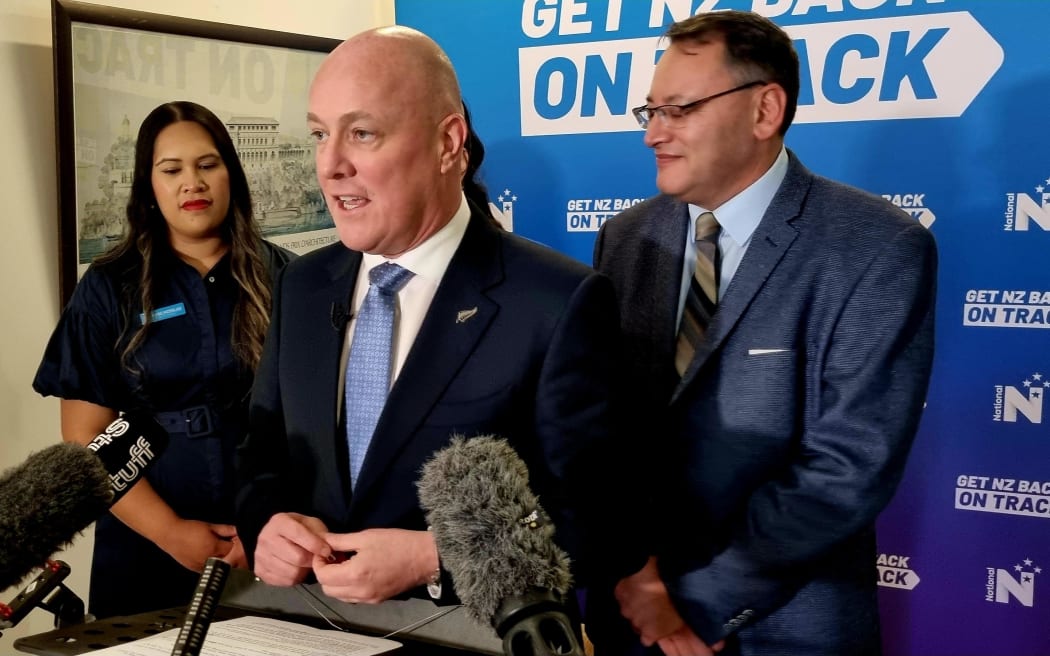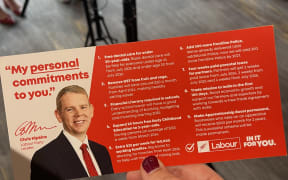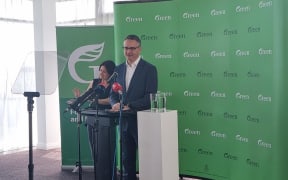
National Party leader Christopher Luxon (centre) and Shane Reti (right) announce new health targets in the Auckland suburb of Grey Lynn. Photo: RNZ / Jane Patterson
National has outlined the health targets it would prioritise in government, and announced plans to directly pay GPs $10 per patient if they boost vaccination rates.
Party leader Christopher Luxon and Health spokesperson Shane Reti announced the policy at the New Lynn Medical Centre in Auckland on Sunday.
The targets include:
- 95 percent of Emergency Department patients discharged or transferred within six hours
- 85 percent of cancer patients receive management within 31 days of decision to treat
- 95 percent of two-year-olds fully immunised with the age-appropriate vaccines
- Target to be set in government: Meaningful reduction in people waiting more than four months to see a specialist
- Target to be set in government: Meaningful reduction in people waiting more than four months for surgery
The party said it would work with the health sector to improve the quality of data for the final two targets to set baselines, then set "ambitious and achievable" targets for improvement once in government.
Progress against the targets would be reported quarterly, broken down by region.
The Immunisation Incentive Payments scheme would see GP clinics paid a lump sum for achieving immunisation targets, including full immunisation for two-year-olds, MMR vaccines for ages 1-17, and influenza vaccines for ages 65+.
They would have to either achieve 95 percent coverage for their childhood patients, and 75 percent for the flu shots, or achieve a five percentage point increase for each of those target groups, by 30 June 2024 to receive the payment.
The party said it would set aside $52 million for the policy, which it said was the maximum cost if every GP clinic in the country achieved the targets.
Read more of RNZ's full election coverage:
- Caucus podcast
- Poll of polls and donations data
- Guide to party policies
- What you need to know about post-election negotiations
Luxon said the health targets would save lives.
"If you get a cancer diagnosis today, and it takes more than four months to get your first specialist appointment and another four months to get your first surgery, that is literally the difference between life and death."
Reti said they would also continue reporting on existing targets, but the party would focus on these ones.
Initially brought in by Labour in 2007, National cut back the number of health targets when it was in government in 2008.
The Labour-led coalition in 2018 ended reporting on many of the requirements, with then-minister David Clark - who is leaving Parliament after this election - saying the targets created "perverse incentives" particularly in relation to surgeries - and measured activity, not outcomes.
For instance, he argued that DHBs at the time were performing easier surgeries to boost their monthly reporting numbers - leaving more complicated ones to be delayed. The Association of Salaried Medical Specialists at the time said the targets had not worked and their blunt nature had in some cases led to patients going blind.
However, National's policy said research into its ED treatment speed target had found a significant decrease in mortality rates - with about 700 fewer deaths compared to the trends expected if the target had not been introduced.
Reti said National's view was that only a small part of the system could be manipulated, and there were ways to fix it.
"For example, the wait time into ED - that it starts when you enter the ED rather than when the ambulance arrived? Well, just stop the clock when the ambulance arrived ... there are many ways to navigate that small part of the system that might be gamed."
He said the targets would be a challenge if the health workforce did not increase, and that was the party's primary goal.
The party has long promised to increase core health funding every year it is in office, and shift funding from back office functions towards the frontline, but Luxon refused to outline by how much.
"Well, we will continue to invest strongly in health care. But what's much more important as we also deliver outcomes," he said.
He disagreed with the suggestion Labour's restructure of the health system - which did away with District Health Boards and set up national health agency Te Whatu Ora in their place - had already cut much of the bureaucracy out of the system.
"I think there's a huge amount of bureaucracy sitting there still, and I think there's a big opportunity for us to make sure that we actually get our investments into the front line that actually deal with the longer term issues."
Labour's Health spokesperson Ayesha Verrall said many of National's targets - and a similar scheme to the immunisation payment - were already in place.
"National has cut and pasted a number of health targets Labour's already set and slapped their logo on it," she said.
"We're already well on the way to achieving no one waiting more than a year for non-urgent surgery. We've already increased the payment to front-line health providers to help increase immunisation rates. National either aren't aware or we're hoping we didn't notice them flogging our policy.
"We know the last time National put in place a limited number of targets it just shifted resources from one part of the system to another. Like their tax plan that is robbing Peter to pay Paul."






